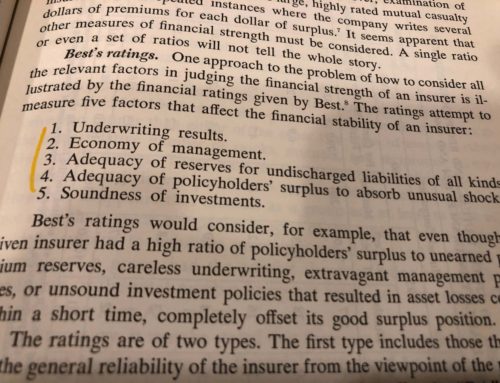Reinsurance
It has always been interesting to business owners when buying insurance to learn that insurance companies also buy insurance. It is the same concept of a contractor transferring his liability to an insurance company. Insurance companies secure “reinsurance” because of major catastrophes and large single losses. This “risk transfer” technique simply keeps the insurance company from being “wiped out” from major common occurrences or one large single occurrence.
Reinsurance is essential for insurance companies to guard against abnormal catastrophes like earthquake. It is also used when risk potential is high such as large policy limits on buildings or equipment. When self-insured groups are formed by Contractors Trade Associations; for example, they too purchase reinsurance. Our agency even sells reinsurance to our self-insured clientele because while they are self-insured, they too have an obligation to meet large losses that could indeed occur in the wrong (or bad) scenarios.
Guaranty Funds
When I began writing insurance books and journals, one headline was tattooed on many people’s minds. The news read: “Largest insurer in the world having financial setbacks!” The negative headlines of a potential or pending financial problem caused me to review the impact policyholders would have if this insurer were not able to fulfill its promise and pay claims. As a consequence, many discussions with the policyholders took place to determine if they wanted their coverage rewritten with more stable insurance companies.
If your insurance company “falls on hard times” and becomes unable to pay claims, all is not hopeless. Most states have Guaranty Funds providing some protection in the event an insurance company becomes insolvent or unable to pay for losses. The statutory limit of protection varies from state to state.
Guaranty Funds perform like an insurance company—setting reserves, adjusting, defending, and settling claims. It does not, however, have the overhead of an insurance company like marketing, paying commissions, premium taxes, or the return premiums due back to a policyholder because of prepaid premium or cancelled policies.
The start-up money to create these Guaranty Funds came about by the state assessing “admitted insurers.” These insurance companies then recover the money by surcharging their policyholders.
Whistle-stop: Be pro-active with your insurance agent and determine what protection you have from the Guaranty Fund. If you are insured by a “non-admitted insurer” or if you participate in a “self-insured fund,” chances are great that you have no protection under a Guaranty Fund. Know in advance where you stand!
While the Guaranty Fund partially fulfills the policy promise, another advantage is that financially troubled insurance companies are allowed time to seek rehabilitation. This positive feature of the Guarantee Funds helps the troubled insurance company from being single-handedly destroyed by “mass exodus” after a negative word about them “hits the street.” Time is needed by the troubled insurance company to fix its problems and to keep from losing good policyholders that they worked so hard to obtain (and need during the rehabilitation phase).
If you’d like to review your business or personal insurance, please call us at 423-763-1111. We hope to answer your questions and serve you!





